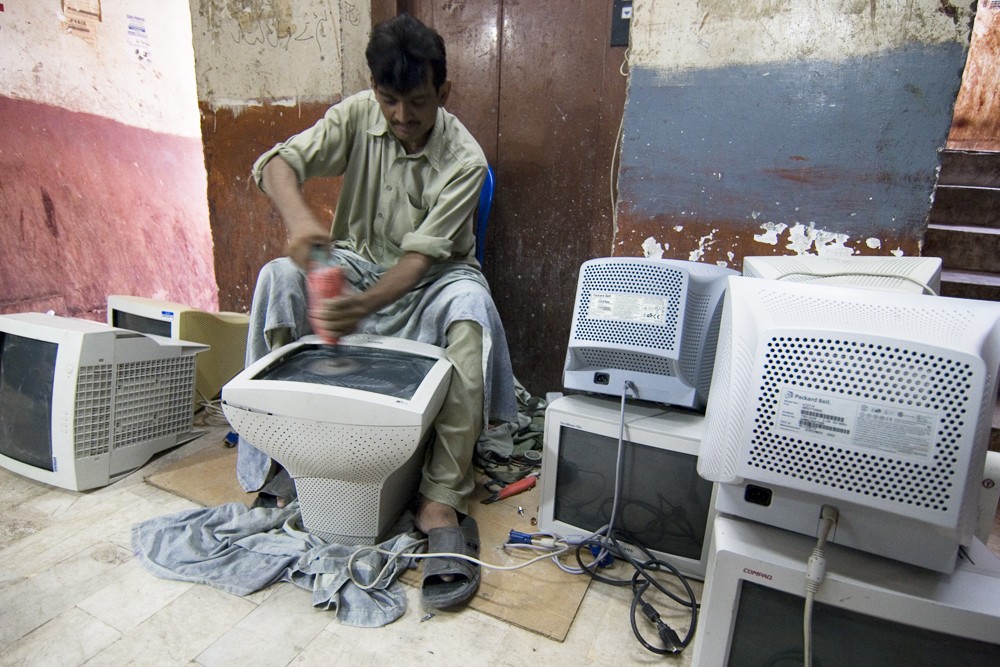Internet Freedom Threatened by Cybercrime Law in Pakistan
Pakistani authorities want to access people’s data stocked online, shut down websites anytime they wish or put people behind bars for trivial activities such as scanning for a wifi network. But a string of valiant activist groups are putting up a good fight.
Blackberry made global headlines in November when it announced that it was wrapping up its operations in Pakistan. The decision was prompted by the request of the Pakistan Telecommunications Authority (PTA), the country’s telecoms regulator, to Blackberry to provide the government access to data in its Blackberry Enterprise Service (BES) through “backdoors” to the encrypted communications.
Blackberry and the PTA are currently in negotiations. On 31 December 2015, the company announced that it would remain in the Pakistan market and identify ways to comply with “lawful” government investigative requests. But it remains unclear what that means in a country that has struggled to introduce cybercrime legislation, which would also govern digital communications, since 2007. That struggle has revealed the extent to which net freedom and basic rights to privacy and free speech are under threat in Pakistan.
Far From the Public Eye
The threat primarily comes in the form of the draft Pakistan Electronic Crimes Bill (PECB), which has been repeatedly revised since its introduction in 2007 under former military ruler Pervez Musharraf’s regime. The PECB has proven controversial since the start owing to its draconian clauses that directly aim to muzzle online expression and provide the state with unfettered surveillance powers.
Clauses in the current draft bill require Internet Service Providers (ISP) to give the government “real time” access to subscribers’ data, retain data traffic for a year, and provide such data to the PTA upon request—no questions asked. The bill’s most controversial article empowers the state to remove and block anything on the web without obtaining a court order or providing any justification for the decision. It also aims to control and criminalize even the most basic online activities, including scanning for a wifi connection or mass emailing. The use of vague language about “spoofing”, cyber-terrorism and morality further increases the room for the government to label almost any activity on any device as a cybercrime.
The government has tried to pitch the bill following a public consultation process, which included industry stakeholders and digital rights groups. But a parliamentary committee tasked to draft the bill and ordered by the speaker of the lower house of Pakistan’s parliament to conduct a public hearing chose in August 2015 to skip the open debate and deliberate behind closed doors instead. The few industry stakeholders who were consulted at the start of the process have repeatedly complained that their minimal input has been modified beyond recognition in the current version of the bill. Opposition political parties have largely been excluded from the drafting process. Even worse, members of the parliamentary committee drafting the bill who had objections to its clauses were not allowed to review the version that was presented for approval on 17 September to the National Assembly.
The Porn Argument
These efforts to dodge parliamentary process are explained by the fact that the PECB seeks legal cover for the existing and increasingly frequent practice of online state censorship. According to Freedom House, a Washington, D.C.-headquartered think tank, more than 200,000 websites are banned in Pakistan owing to their allegedly blasphemous or pornographic content. However, many of these sites, including those run by separatist groups or religious minorities, are banned for political reasons, including criticism of the military and its human rights record and lack of transparency.
The Inter-Ministerial Committee for the Evaluation of Websites (IMCEW) decides which websites to block in Pakistan. This committee comprises representatives of the PTA, the Ministry of Information Technology, the Ministry of the Interior, the federal cabinet, military, and the three branches of the national intelligence agencies. In the absence of specific legal frameworks regarding internet regulation, the IMCEW directly orders ISPs to block websites. In recent years, the committee has ignored calls by digital rights groups for greater transparency, including the provision of an up-to-date list of all blocked websites and reasons for blocking them. Proper legislation could protect Pakistan’s internet users from the committee’s arbitrary decisions, but the PECB as it stands would likely embolden them.
Debates over the cybercrime bill show the Pakistani state’s contradictory nature as an emerging democracy that seeks to retain the powers of an authoritarian state. Security concerns in the context of Pakistan’s decade-long battle with homegrown militancy are increasingly being used to justify the trampling of basic rights, including free expression and privacy.
However, the controversy has also demonstrated the increasing sophistication of Pakistan’s civil society.
Fighting Back
Digital rights groups such as BoloBhi, Digital Rights Foundation and Bytes for All have been at the forefront of the fight against the PECB. They have used social media to mobilize online and offline communities, circulated petitions, attracted international media attention, and documented the parliamentary proceedings related to the bill on blogs, digital timelines, Twitter, Storify and more. The groups’ success in preventing the bill’s passage thus far shows the growing power of digital activism, and points to the need for even greater internet access, net freedom, and digital media literacy amongst the country’s booming youth population, over 60% of which is under the age of 25.
With regards to PECB, the year is off to a positive start. The chairman of the Senate made it clear that the draft bill would not be passed into law by the upper house of parliament, and called for further consultation and a fresh parliamentary committee and review process. His comments have further emboldened digital rights groups to persist with advocacy efforts.
But it is unclear whether a more democratically palatable PECB will be forthcoming as long as the state remains ambivalent about the power of online freedom.
Photo: Seattle Globalist

